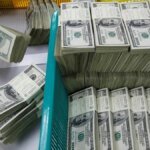SINGAPORE – Asian currencies rallied to their highest level in seven months as ebbing US recession concern, bets on Federal Reserve rate cuts in September and an improving domestic backdrop lifted sentiment in the region.
The Bloomberg Asia Dollar Index gained as much as 0.6 per cent on Aug 19 to its highest level since January. The Malaysian ringgit and South Korean won led the regional advance on upbeat growth prospects, and the Thai baht rose on easing political tensions.
“It feels like a Goldilocks scenario, where US recession fears fade while growth momentum in the region remains moderate,” said Mr Christopher Wong, a foreign exchange strategist at OCBC Bank.
“There is room for Asia ex-Japan currencies to recover against a backdrop of developed-market central banks largely on an easing bias.”
The ringgit rose as much as 1.5 per cent to 4.3678 per US dollar, the strongest since February 2023.
On Aug 16, the nation reported a stronger-than-expected increase in second-quarter gross domestic product from 2023, while global funds poured the most cash into its stock market since June.
Against the Singapore currency, the ringgit was trading up 0.4 per cent at 3.3457 per Singdollar at 5.16pm.
The baht extended gains to 34.42 per dollar, the highest since January, after Ms Paetongtarn Shinawatra on Aug 16 won enough votes in Parliament to become Thailand’s next prime minister.
While her appointment helped to quell concerns of a protracted political vacuum after her predecessor was ousted by a constitutional court, the currency could face a bumpier path ahead amid reports that the new government may scrap a US$14 billion (S$18.4 billion) digital cash handout programme.
The relationship between the new government and the Bank of Thailand will also be in focus again due to the new premier’s previous criticism of the central bank.
Goldman Sachs Group economists on Aug 17 lowered the probability of a US recession in the next year to 20 per cent from 25 per cent, citing last week’s better-than-expected US retail sales and jobless claims data. They also said they were “more confident” that the Fed will cut interest rates by 25 basis points at its September policy meeting.
Easing concerns of a recession in the world’s biggest economy is a positive for Asia’s export-oriented nations. The South Korean won rallied 1.4 per cent to 1,332.25, the highest since March, while the yen advanced 0.5 per cent to 146.84 per dollar. The Philippine peso rallied 1 per cent to 56.67 per dollar, its biggest gain since November 2023.
The Bloomberg Dollar Spot Index slipped 0.3 per cent as traders waited for Fed chairman Jerome Powell’s speech at the Jackson Hole symposium later this week for clues on rate cuts. A gauge of aggregate demand for bullish call options over bearish puts on the US currency showed traders were split on what direction to hedge against, having paid up for bets on a stronger dollar for much of the year.
Regional equities also climbed on Aug 19, with the benchmark MSCI Asia-Pacific Index rising almost 1 per cent to head for its highest close in a month.
Mr Tomo Kinoshita, global market strategist at Invesco Asset Management Japan, said: “The market is envisaging a brighter picture for Asian economies in the coming quarters.” He expects investors to allocate more funds to Asian equities, especially to those in India, Indonesia and Malaysia. BLOOMBERG














